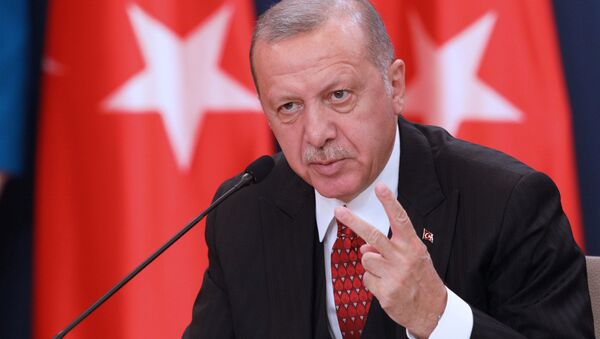Sputnik: Angela Merkel has said that Berlin will not deliver any arms to Turkey in the wake of its operation in Syria. How may this affect overall Turkish-German relations?
Berk Esen: Due to the migration crisis, the Erdogan administration holds a huge leverage vis-a-vis the EU, and that has led many Western governments to tone down their criticisms in recent years. However, the operation seems to have unified the West in its opposition to the Erdogan government. Thus, this decision will widen the political rift between Turkey and Germany. The two governments clashed with each other in recent years due to the latter country's support for Gulenists and criticism of Turkey's democratic backsliding. In the past, Merkel tried to moderate her government's approach towards Turkey due to the Syrian migration crisis but an overwhelmingly negative German public opinion has made this difficult. Such moves make reconciliation between the two sides very difficult, especially when both public opinions turn so negatively towards each other.
Sputnik: What countermeasures could Ankara implement after this ban?
Berk Esen: Ankara has two primary options at its disposal. As it has done in recent years, it could turn towards alternative suppliers which sell weapons without any political criteria, such as Russia and China. I suspect we may see further rapprochement between [Turkey and Russia], especially if Trump administration decides to widen the sanctions on Turkey. Moreover, Erdogan government can and probably will push for a higher degree of self-sufficiency in Turkish defence sector. Ironically, Turkish defence industry had initially emerged in the 1970s when the US Congress placed sanctions on Turkey for its Cyprus policy.
Sputnik: There have been reports that Berlin's weapons sales to Turkey have reached their highest level in 14 years. In your view, can Germany's stance on Turkey's operation in Syria influence this surge?
Berk Esen: Germany is Turkey's main supplier of modern tanks and that has contributed to the increase in Berlin's weapons sales to Turkey. If it were to continue, the current ban can really hurt the Turkish military capability, especially in the short term.
Sputnik: What impact can this have on President Erdogan’s rhetoric regarding the operation itself?
Berk Esen: Erdogan is a playing a two-level game. He is trying to generate public support for his regime through the operation, while also expanding Turkey's influence in Syria so as to have a stronger bargaining position vis-a-vis Syria. Ultimately, these bans do not change the Turkish public opinion's opinion, so Erdogan does not have an incentive to back down, though we will see the operation lose some steam.
Sputnik: How popular is this operation in Northern Syria among the public in Turkey?
Berk Esen: Its difficult to say definitely how the Turkish electorate feels about the operation without an opinion survey. However, based on the public outcry against Western sympathy towards the SDF, one could suggest that the operation itself is quite popular.
The Turkish public overwhelmingly sees the YPG to be linked organically to the PKK terrorist organisation and finds the prospect of a Kurdish autonomous zone in northern Syria a threat towards Turkey. Therefore, I think the operation is quite popular and the Western opposition may have hardened this stance. All mainstream opposition parties came out in support of the military operation. The high level of international resistance towards the operation, not to mention the US sanctions and EU arm sale bans, will further increase the political risks in the country.



